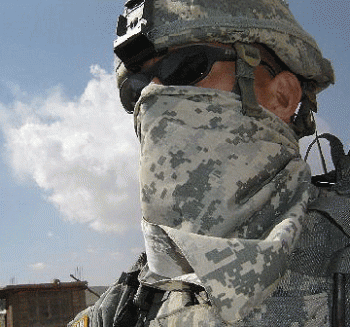
A NEW KIND OF WARRIOR
Bob Ellis &
Ken Grissom
Maj. Harold Molbert has a knack for being where the action is.
The 1982 graduate of Breaux Bridge Senior High, son of Anthony Molbert and the late Lucy Angelle Molbert, was one of the first responders at the scene of a Oklahoma City bombing in 1995. He helped with the recovery effort when the space shuttle broke up over Texas in 2003, and helped to mobilize an unprecedented amount of men and materiel after Katrina in 2005.
In July of 2006, Molbert was again in the thick of things, although arguably in the wrong place at the wrong time.
“I was leading a reconnaissance patrol in the eastern province of Konar, along the Pech River Valley,” Molbert said. “I was in the lead vehicle and a roadside bomb, an IED, went off in front of my vehicle. No one got killed but I ended up with a broken bone in my neck and mild traumatic brain injury.”
Molbert is undergoing rehabilitation at the Washington D.C. VA Medical Center.
“But I have no regrets,” he said. “What we’re doing there is extremely important.”
Molbert, who is stationed at the National Guard Bureau in Arlington, Va., will be promoted to lieutenant colonel this summer.
Background
He joined the National Guard in Lafayette in 1984. He went to went to OCS at Pineville and was commissioned a second lieutenant in 1988. His first command was of the headquarters company of the 256th in Lafayette.
He moved to Oklahoma in 1995 and transferred to a Guard unit there just in time to be in charge of securing a five-block area of Oklahoma City after the bombing of the federal building there. Molbert’s career took an abrupt turn at that point.
“During that same time period we had the Aum Shinrikyo gas nerve agent attacks in Japan, and the first World Trade Center attack in New York City,” he said. “Congress directed the Department of Defense to commission a tiger team study. The purpose was to determine, had the Oklahoma City bombing been a terrorist attack that involved chemical or biological agents, would the first responders have had the assets to determine what that agent would be? And the obvious answer was no.”
Molbert, still a part-time guardsman, found himself on one of the Weapons of Mass Destruction Civil Support Teams set up by DOD. Three years later he went full-time with the Guard and was assigned to the National Guard Bureau as a training officer for all of the teams. He was also one of those who responded to the breakup of the Space Shuttle Columbia in 2003.
Katrina
When Hurricane Katrina struck, Molbert helped facilitate the movement of about 54,000 National Guardsmen.
“It was the single largest movement of the military for a natural disaster, not in the history of the United States but in the history of the world,” he said.
“There has been a lot of finger-pointing but one of the great successes we never get credit for is how fast, how many and how much equipment we put in this state and others on the Gulf Coast. It truly was a Herculean effort that was very rewarding.”
Then in January 2006, Molbert shipped off to Afghanistan for a very different kind of duty — as a tactical trainer imbedded with units of the Afghan National Army.
The Infantry
“I started off as a company trainer where I worked with about 100 Afghans and after several months moved up to battalion team trainer where I had 16 Americans under me and about 800 Afghans. Four weeks after that, I was selected to be the brigade executive officer and spent the majority of my tour second in command of 350 Americans and about 2,700 Afghans.”
Molbert and his soldiers fought in the dangerous Hindu Kush Mountains of eastern Afghanistan, in elevations of from 8,000 to 14,000 feet.
“It was a tough year,” he said. “We lost 52 killed in action and 300 wounded. It was hard fighting but we saw the Afghans improve. The majority of the Afghans we met, civilians and military, were extremely glad we were there. It was probably one of the better years in my military career.”
Molbert expects to be back in Afghanistan or Iraq by September, again as an imbedded tactical trainer.
“I could do other staff jobs but it was rewarding to work and fight side by side with those soldiers,” he said.
The Good Fight
“I think we’re going to have to be in that country for another 15 or 20 years. You can’t stabilize that country overnight. And the American people have to understand that Americans share the blame in creating a leadership void in Afghanistan. Most Americans might remember we funded the mujahedin freedom fighters, but our official policy was just to push the Russians out and nothing more. We weren’t to get involved, at this time in the late ’80s, with regime change. We said they would basically figure it out on their own — and that void of leadership, as most Americans know, created a breeding ground for extremist groups like al-Qaida.”
While Molbert’s expertise remains in homeland security, he feels he is contributing to that very thing in the Middle East.
“This really is a long war,” he said. “And we have to continue to destroy our enemy or they’re going to destroy us.”
- Log in to post comments

